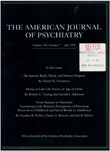Value of the DST for predicting response of patients with major depression to hospitalization and desipramine
Abstract
The authors examined the value of the dexamethasone suppression test (DST) for predicting response of patients with unipolar, nonpsychotic major depression to 1 week of hospitalization without antidepressant drugs and to a 4-week trial of desipramine at a fixed plasma level. The rates of response to hospitalization without drug treatment (defined as a score of 12 or less on the Hamilton Rating Scale for Depression) were not significantly different for the patients with a positive DST and those with a negative DST. This finding differs from those of prior studies of the DST and response to placebo. The responses of the DST- positive and DST-negative patients to desipramine also did not differ, a finding that replicates those in some prior reports.
Access content
To read the fulltext, please use one of the options below to sign in or purchase access.- Personal login
- Institutional Login
- Sign in via OpenAthens
- Register for access
-
Please login/register if you wish to pair your device and check access availability.
Not a subscriber?
PsychiatryOnline subscription options offer access to the DSM-5 library, books, journals, CME, and patient resources. This all-in-one virtual library provides psychiatrists and mental health professionals with key resources for diagnosis, treatment, research, and professional development.
Need more help? PsychiatryOnline Customer Service may be reached by emailing [email protected] or by calling 800-368-5777 (in the U.S.) or 703-907-7322 (outside the U.S.).



